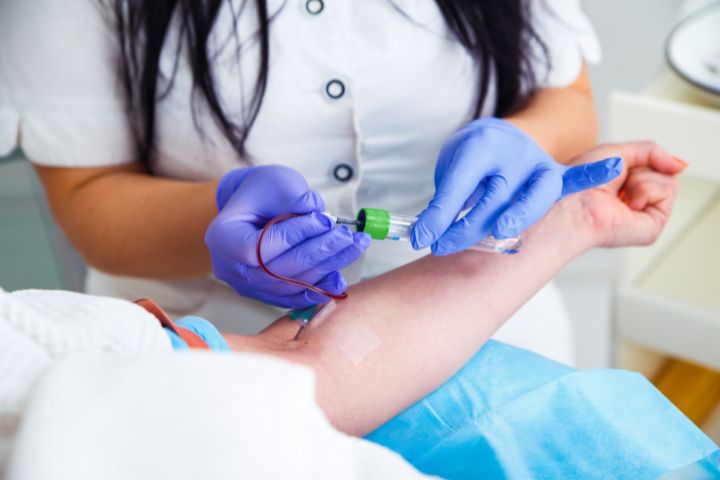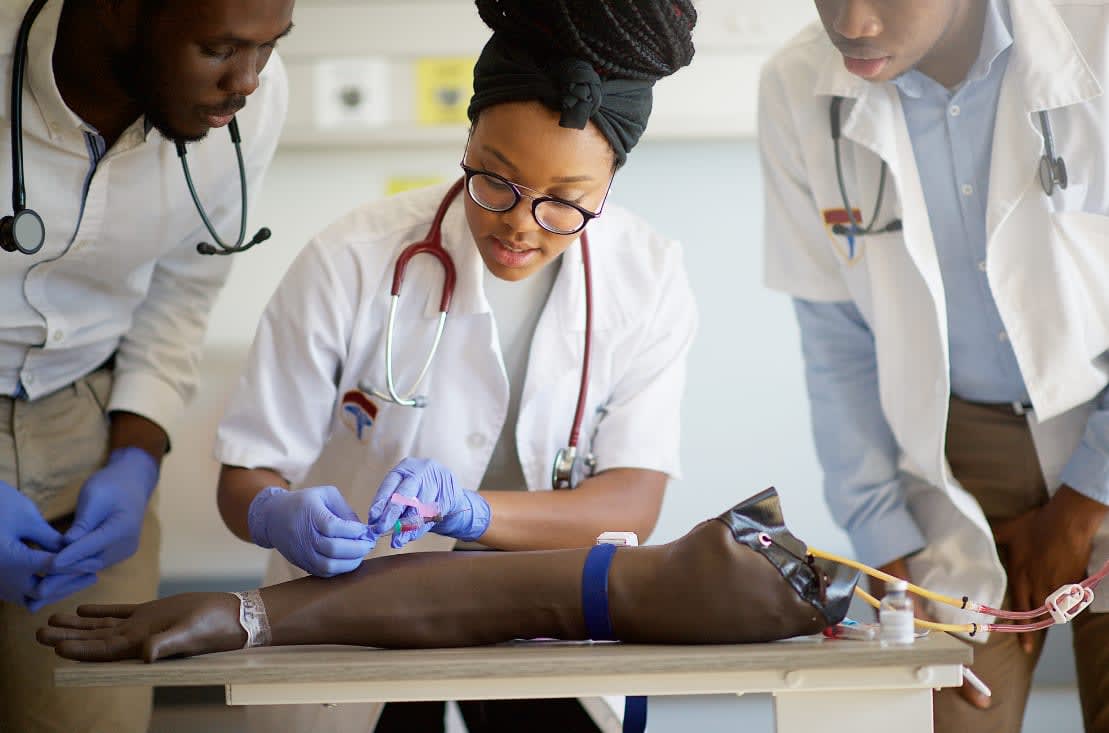Phlebotomy Courses Near Me: Step-by-Step Application Process
Phlebotomy Courses Near Me: Step-by-Step Application Process
Blog Article
The Path to Accreditation: Recognizing the Phlebotomy Educating Training Course Trip and Its Relevance
As you take into consideration the course to qualification in phlebotomy, it's crucial to comprehend the role you'll play in healthcare. Your training will certainly cover necessary skills, from blood collection methods to patient interaction.

The Role of Phlebotomists in Medical Care
Phlebotomists play a necessary role in the medical care system, functioning as the important link in between clients and important analysis testing. You'll execute blood draws, making certain samples are collected precisely and securely. Your experience assists in detecting medical conditions, monitoring health and wellness, and leading treatment choices.
In your daily interactions, you'll require to establish depend on with people, making them feel comfy during what may be a difficult experience. You're liable for labeling and managing examples carefully to avoid contamination or mistakes, which could impact examination outcomes.
Yet, you'll typically function along with doctors and nurses, interacting critical info regarding people' problems. Your duty is fundamental in preserving the process in medical care setups, making certain timely and precise results. By grasping your abilities, you add meaningfully to person treatment, making you a vital component of the clinical group. Accepting this responsibility is crucial to your success as a phlebotomist.
Summary of Phlebotomy Training Programs
When exploring phlebotomy training programs, you'll find numerous kinds created to fit different schedules and discovering designs. Each program assists you develop essential abilities like blood collection and person communication. Understanding these options is vital to choosing the right course for your occupation.
Types of Training Programs
Numerous kinds of training programs are available for those looking to come to be skillful in phlebotomy. You can select from certificate programs, which generally last a couple of months and concentrate on vital skills. There are additionally diploma programs that supply a more comprehensive education, usually lasting as much as a year. If you're searching for a much deeper understanding, an associate degree in a related area could be the appropriate fit. On the internet courses supply versatility for those balancing work or family members commitments, permitting you to examine at your very own speed. Additionally, some hospitals and centers supply on-the-job training programs, offering sensible experience while you discover. Whatever course you choose, each program aims to outfit you with the required abilities for an effective phlebotomy profession.

Key Skills Established
Grasping phlebotomy needs a set of crucial abilities that are created via comprehensive training programs. You'll learn technical skills like proper vein option, needle insertion, and blood collection strategies. These hands-on techniques assure you can carry out procedures safely and efficiently. In addition, interaction abilities are fundamental; you'll require to connect with individuals, describe treatments, and put them at simplicity. Comprehending anatomy and physiology is vital, too, as it helps you situate blood vessels and comprehend the body's action to blood attracts. You'll get knowledge of security protocols and infection control, assuring you maintain a clean and sterile atmosphere. Each of these skills is crucial for your success as a qualified phlebotomist, making you a useful asset in any kind of healthcare setup.
Trick Components of a Phlebotomy Program
In a phlebotomy training course, you'll focus on crucial topics that lay the foundation for your future profession. You'll participate in hands-on training that allows you to apply what you have actually learned in real-world settings. Both the curriculum and practical experience are important for your success as a phlebotomist.
Core Educational Program Summary
While seeking a phlebotomy training course, you'll come across a core educational program designed to furnish you with basic abilities and knowledge. Phlebotomy Classes Near Me. This curriculum normally consists of anatomy and physiology, concentrating on the blood circulation system and understanding blood components. You'll likewise find out around various types of blood collection methods, including venipuncture and capillary leak methods
In addition, infection control and safety procedures are necessary parts, guaranteeing you know exactly how to preserve a sterilized setting. You'll research patient communication, highlighting communication and empathy, which are vital for alleviating person anxiousness. Ultimately, ethical and lawful he has a good point factors to consider will certainly be resolved, preparing you for real-world obligations. This fundamental expertise will certainly enable you to excel as a phlebotomist and provide high quality care in clinical settings.
Hands-On Training Experience
Obtaining hands-on experience is an essential component of your phlebotomy training course. This functional training allows you to apply what you have actually learned in a real-world setup, boosting your skills and self-confidence. Phlebotomy Courses Near Me.
Furthermore, you'll obtain the chance to engage with clients, which is essential for establishing your interaction abilities. This combination of technical effectiveness and social skills is important for your success as a certified phlebotomist. Eventually, hands-on training is where concept meets method, strengthening your knowledge and readiness for accreditation.
Qualification and Licensing Requirements
Before you can start your occupation in phlebotomy, it is essential to understand the qualification and licensing needs that vary by state. Many states need phlebotomists to hold an accreditation from an identified company, such as the National Phlebotomy Organization or the American Culture for Clinical Pathology. These certifications normally entail passing an exam that evaluates your understanding and skills in the field.
Along with accreditation, some states have certain licensing needs. You might require to finish a particular variety of hours in professional technique, send evidence of training, or undertake a history check. It is very important to investigate your state's laws to ensure you fulfill all needed requirements.
Staying informed about these requirements not just aids you safeguard a setting however likewise enhances your trustworthiness as an expert. By satisfying these demands, you'll be well on your method to a successful career in phlebotomy.
Hands-On Training and Practical Experience
Hands-on training and practical experience are crucial parts of your phlebotomy education and learning, as they enable you to apply academic expertise in real-world circumstances. Throughout your training, you'll engage in supervised venipuncture, find out appropriate techniques, and become accustomed to different blood collection equipment. This straight have a peek at these guys involvement is crucial for building your self-confidence and refining your skills.
You'll work closely with seasoned experts that can lead you with the nuances of person interaction and example handling. Each session not only enhances your understanding however also prepares you for the busy environment of medical care settings.
Additionally, numerous programs include medical rotations, allowing you to experience varied settings, from medical facilities to outpatient facilities. This exposure aids you adapt to various challenges and individual needs, ensuring you're well-prepared for your future duty. Embrace these possibilities, as they're important to coming to be a qualified and compassionate phlebotomist.
Difficulties Encountered During Training
While gaining hands-on experience is essential, it's essential to acknowledge the difficulties that can develop throughout your phlebotomy training. In addition, mastering the skills required for blood draws takes practice; you may struggle with method originally.
Time monitoring can additionally be a difficulty, as harmonizing concept, sensible sessions, and individual dedications can really feel daunting. You might encounter differing discovering rates amongst your peers, bring about sensations of insecurity if you believe you're dropping behind. Lastly, adapting to the different personalities of trainers can be challenging, as each might have a distinct mentor style.
Identifying these challenges early can prepare you for success and assist you develop strength throughout your training trip.
Profession Opportunities After Certification

As you obtain experience, you may also consider focusing on areas like pediatric or senior citizen phlebotomy, satisfying certain patient requirements. Some phlebotomists pick to progress their professions by coming to be laboratory service technicians or seeking further education in healthcare fields.
In addition, your certification can result in functions in training or supervising new phlebotomists, enabling you to share your expertise. With the healthcare industry continuously expanding, your abilities will certainly constantly remain in need, leading the way for a stable and satisfying occupation. Welcome the possibilities waiting for you!
Frequently Asked Questions
What Is the Common Period of a Phlebotomy Educating Training Course?
Phlebotomy training courses generally last around four to eight weeks. You'll participate in hands-on practice, classroom instruction, and online knowing. Completing this training prepares you for accreditation and a fulfilling job in medical care.
Are Online Phlebotomy Courses Available?
Yes, on-line phlebotomy training courses are readily available. find out here They supply adaptability and ease, permitting you to research at your very own speed. Just confirm the program is approved to fulfill qualification needs and get useful skills for your career.
Just How Much Does Phlebotomy Training Typically Cost?
Phlebotomy training commonly sets you back in between $700 and $2,500, depending upon the program and location. You ought to think about elements like course length, included products, and hands-on experience when selecting the best training for you.
What Are Common Requirements for Phlebotomy Training?
Common requirements for phlebotomy training usually consist of a secondary school diploma or GED, booster shots, and a background check. Some programs might also need basic health care knowledge or qualifications, ensuring you're gotten ready for hands-on training.
Can I Function While Completing My Phlebotomy Training?
Yes, you can work while finishing your phlebotomy training. Lots of students equilibrium work with their research studies, yet ensure to handle your time effectively to ensure you fulfill both job and training commitments successfully.
Report this page